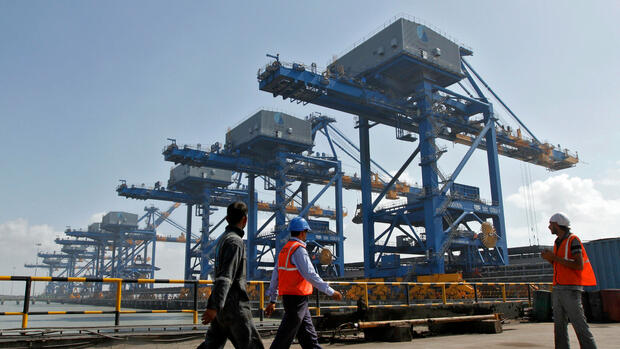Bangkok It sounded like an unproblematic order in an important growth market. In the summer of 2021, Siemens delivered components for harbor cranes to the Indian coastal city of Mundra – the Adani conglomerate operates the country’s largest commercial port there. But just a few months later, the Siemens technology was apparently found somewhere else: in Adani’s controversial port project in Myanmar, which democracy activists say is filling the coffers of the country’s brutal military regime.
The process, which the Justice For Myanmar organization uncovered using leaked documents, once again highlights the at least dubious business conduct of the Indian group. The Adani Group was at the center of fraud allegations earlier this year, losing more than $100 billion in market value following a critical report by short sellers. With regard to the Adani project in Myanmar, it now looks as if Siemens has deliberately received false information about the planned use of its technology.
A Siemens spokesman said on request that they had received an order for components for cranes in Mundra. According to its own statements, the Dax group acted as a subcontractor in the business and had no direct contract with Adani. However, it was apparently clearly regulated that the technology should remain in India: Siemens announced that Mundra had been specified as the final destination for the delivery. There is no information about a relocation of the cranes to another location.
Port project linked to sanctioned company
However, the documents found by Justice For Myanmar and available to the Handelsblatt seem to prove the change of location: In a letter to the finance minister of Myanmar’s military junta in August 2022, Adani asked for a waiver of customs duties for three rail-bound cranes that had already been imported. According to the letter, these were previously equipped with Siemens technology in India.
Additional documents also show that the cranes were delivered from Mundra to the Adani project in Myanmar, where they arrived in February 2022. Adani left unanswered an inquiry about the alleged diversion of Siemens technology from India to Myanmar.
The deal is particularly sensitive because of the port project’s ties to a company sanctioned by the EU and the US: Adani had leased the land for the planned container terminal from the Myanmar Economic Corporation (MEC), the commercial arm of the military regime. According to an agreement disclosed last year, Adani agreed to pay MEC up to $52 million.
>> Read also: India’s Rise – Why the country can now only jeopardize its own success
According to the EU sanctions decision of April 2021, the conglomerate MEC serves to generate income for the military, which is internationally banned due to allegations of serious human rights violations. The regime’s brutality was particularly evident last month when more than 150 people were killed in an airstrike on a village inhabited by opponents of the regime. According to observers, the armed forces have killed more than 3,000 people since the military coup in February 2021.
Adani has always emphasized that it will comply with all sanctions in the country and declared in October 2021 that it wanted to part with the port project. However, the import of the cranes with Siemens technology shows that the company continued to push ahead with the construction of the port later on. Last Thursday, Adani announced that it had found a buyer for the highly controversial Myanmar deal. Adani is to receive a purchase price of $30 million, around $120 million less than the group has invested in the port to date.
Adani leaves questions about port buyers unanswered
But the exit raises new questions. Adani indicated a company called Solar Energy Limited as the buyer. Even when asked, Adani did not reveal the background to the new port owner, who is considered completely unknown among Myanmar connoisseurs. It is not clear which country the buyer is based in, nor who controls the company.
It also remains unanswered why a company whose name is specialized in solar energy suddenly bought a port. The only thing that is certain is that the new owner can take over the investments made so far at a low price. “Adani’s irresponsible exit also raises serious questions for Siemens,” Yadanar Maung, spokeswoman for Justice For Myanmar, told Handelsblatt. “Siemens technology is now being taken over by a company whose owner Adani has not yet revealed.”
Yadanar Maung is calling on the authorities in Germany to investigate whether the delivery of Siemens technology via India to Myanmar constitutes a violation of EU sanctions. Siemens emphasizes that the company is committed to protecting human rights and has control systems in place to “ensure compliance with all export control rules and other regulations”.
>> Read also: The hyped India as a land of unlimited difficulties
It is not the first time that the Munich-based Dax group has been linked to a controversial Adani project: environmentalists have criticized the group in the past for supplying signaling technology for a controversial coal mine in Australia developed by the Indians.
Over the past few decades, the Adani Group has developed from a coal importer into one of the country’s largest conglomerates. In addition to power plants, it operates airports and television stations, among other things.
Founder Gautam Adani was at times the third richest man in the world with a fortune of $120 billion. However, it experienced a deep fall in late January after US investor and short seller Hindenburg Research accused the group of fraud and price manipulation. The entrepreneur denied the allegations, but has so far been unable to regain investor confidence: The share price of the holding company Adani Enterprises is still 50 percent lower than at the beginning of the year. Gautam Adani’s personal fortune has more than halved to $50 billion.
More: How German companies do business with the military junta
